Tim Atkinson's Blog, page 12
December 10, 2018
Pat Barker: The Silence of the Girls
 The Silence of the Girls by Pat Barker
The Silence of the Girls by Pat BarkerMy rating: 4 of 5 stars
It's boom-time for classical mythology re-treads. They're all at it: Madeline Miller, Kamila Shamsie, Natalie Haynes. Even Stephen Fry's jumped on the bandwagon. And the most recent trend has been giving voice to history's silent voices: women. Circe, in Miller's case, and now Breseis in Pat Barker's female-orientated re-telling of The Iliad.
I spent much of the time I was reading this book thinking it was little more than just that: a re-telling of an ancient myth. Yes, from a female perspective; yes, giving voice to those denied it for three thousand years of history. But not adding much to the story: not providing any real insights into what is obvious to a modern reader of Homer, not adding much to help us read between the lines of the old, old text.
Only towards the end does The Silence of the Girls really get going. With the haunted dreams of Achilles (recalling the merciless slaughter of battle) we see the original hero for the first time as something more than a mere monster. And by then - just as with the Homeric epic it derives from - it’s (almost) too late. But just as Achilles’ one final act of contrition restores a glimmer of humanity to the story, Barker’s last-gasp grapple with some serious psychology restores her own literary authority, her ownership of this story, along with some sense that she’s done slightly more than merely re-write the original, adding the odd 'fuck' and 'piss' and 'prick' to the archaic dialogue.
That aside, there are some memorable lines, economically expressed. 'Thanks to them, he’s never alone, and because they’re not Patroclus he’s never more alone than when he’s with them' (p.255) writes Barker of a man sunk in depths of almost insurmountable mourning: 'because grief’s only ever as deep as the love it’s replaced' (p.248). And the changes in tense and perspective between Breseis’ first-person, past-tense narrative and the vivid but anonymous first-person narration of the author (? - it’s never made clear) are as smooth as the most sophisticated, well-oiled, chariot axle.
The Iliad may be among the oldest stories ever told but its's never been static. Each generation seems to express a need to transform it to suit a new audience. Latin poets such as Dares of Phrygia made of it a sort of 'boy's own' adventure to inspire heroic feats while Virgil, of course, transformed the events into the founding myth of Rome.
This is all understandable. We don’t get the 'happy ever after' in the original that we’re so desperate for. The reconciliation between Priam and Achilles comes to late. It ends badly for them both. And we don't even hear how (not in The Iliad at least).
Barker's magic, too, comes just a little too late to transform a prosaic retelling into something more, something is so obviously could have been, but which for most of it's relatively short length is a straightforward re-telling of the original... albeit from the perspective of a woman.
Then again, maybe that's all it needs to be?
View all my reviews
Published on December 10, 2018 02:58
November 30, 2018
Brexit: the Conservative Conspiracy
I think we all know now (whether we admit it or not) that Brexit - however it happens - is going to be a disaster.
How we explain this mess to our grandchildren is another matter. Historians are no doubt already sketching out the broad narrative of a Tory rift, a foolish leader, a failed attempt to lance the boil and the inevitable slide into chaos and a deeply divided nation.
But just suppose, for a moment, that it wasn't. Just suppose the EU referendum was part of a deliberate plan. What if...
It was meant to happen?
I know, I know. Ridiculous.
But.
The main issue throughout the campaign and its aftermath has been immigration. Taking back border control. Restricting the free movement of EU citizens across national borders.
Theresa May - who as Home Secretary presided over Operation Vaken - has said as much herself in her spirited (you've got to give her that) defence of the Brexit treaty. We're not got much else out of it. But we've got that.

Immigration figured pretty high on people's reasons for voting leave in my neck of the woods. It's also figured high on people's fears post-Brexit. Because - in common with a lot of areas - there are an awful lot of migrants living and working here. Not just in the health service, or waiting on tables or helping in care homes. In the fields. Getting up at four a.m. to spend eight hours in back-breaking hard labour harvesting the food we buy fresh (and cheap) each day.
And what happens to that when they're gone? It's hardly skilled work. It doesn't demand much more than physical strength and stamina. So the thousands that do these jobs are hardly likely, it would seem, to receive protection in the new, post-EU Britain.
Unemployment is at an historic low. There can't be much slack there, can there? And yet there are (so it's said) over 800,000 job vacancies at present.
What if you think - thought, years ago - that there was some slack in the system? What if you thought that most if not all the benefit claimants were good-for-nothing slackers who needed to be made to get up off their comfortable sofa and apply for one of these vacant jobs?
And what if you deliberately dismantled the benefits system and replaced it with a something almost as coercive as parish relief, or the workhouse? And what it... you'd done all that deliberately, along with the (otherwise inexplicable) Brexit vote and treaty?
It's the novelist in me, I suppose. I can't resist a good conspiracy theory. It's almost certainly not true. Although it's strange how such an outrageous, immoral, anti-social, corrupt and outlandish spin can be put on things without much effort.
No doubt there are 'facts' and 'experts' out there who can gainsay it all.
No doubt.
But looked at from afar, and from a different perspective, it doesn't seem at all outlandish.
Does it?
How we explain this mess to our grandchildren is another matter. Historians are no doubt already sketching out the broad narrative of a Tory rift, a foolish leader, a failed attempt to lance the boil and the inevitable slide into chaos and a deeply divided nation.
But just suppose, for a moment, that it wasn't. Just suppose the EU referendum was part of a deliberate plan. What if...
It was meant to happen?
I know, I know. Ridiculous.
But.
The main issue throughout the campaign and its aftermath has been immigration. Taking back border control. Restricting the free movement of EU citizens across national borders.
Theresa May - who as Home Secretary presided over Operation Vaken - has said as much herself in her spirited (you've got to give her that) defence of the Brexit treaty. We're not got much else out of it. But we've got that.

Immigration figured pretty high on people's reasons for voting leave in my neck of the woods. It's also figured high on people's fears post-Brexit. Because - in common with a lot of areas - there are an awful lot of migrants living and working here. Not just in the health service, or waiting on tables or helping in care homes. In the fields. Getting up at four a.m. to spend eight hours in back-breaking hard labour harvesting the food we buy fresh (and cheap) each day.
And what happens to that when they're gone? It's hardly skilled work. It doesn't demand much more than physical strength and stamina. So the thousands that do these jobs are hardly likely, it would seem, to receive protection in the new, post-EU Britain.
Unemployment is at an historic low. There can't be much slack there, can there? And yet there are (so it's said) over 800,000 job vacancies at present.
What if you think - thought, years ago - that there was some slack in the system? What if you thought that most if not all the benefit claimants were good-for-nothing slackers who needed to be made to get up off their comfortable sofa and apply for one of these vacant jobs?
And what if you deliberately dismantled the benefits system and replaced it with a something almost as coercive as parish relief, or the workhouse? And what it... you'd done all that deliberately, along with the (otherwise inexplicable) Brexit vote and treaty?
It's the novelist in me, I suppose. I can't resist a good conspiracy theory. It's almost certainly not true. Although it's strange how such an outrageous, immoral, anti-social, corrupt and outlandish spin can be put on things without much effort.
No doubt there are 'facts' and 'experts' out there who can gainsay it all.
No doubt.
But looked at from afar, and from a different perspective, it doesn't seem at all outlandish.
Does it?
Published on November 30, 2018 04:11
November 23, 2018
Boycott Black Friday
Things are black. Bleak, in fact. And not just on Black Friday.
First up, here's a conversation on Tumblr by some people working in retail today.

When did we become these frantic, headless chickens going round in circles chasing things we often don't need, can't afford and won't use?
Does this make us happy? It certainly doesn't if you're one of the many thousands of people paid a pittance to sell the stuff.
It undoubtedly makes a few people very, very rich indeed. They tend not to be the kind of nice people who pay their workers properly, protect their pensions and give what they don't need to charity. (Some do, I know. But not many.)
So basically, what we're all doing is making a few rather dodgy individuals even richer at the expense of a lot of other folks... including ourselves. Because once we've spent it, we've not got it.
Here's a revolutionary thought. Don't buy anything today. Don't buy anything apart from food and clothes for the children and the things you really do need.
If you must buy something for someone, buy them a book. (I've got a few of my own - including this one - you could do worse than take a look at!)
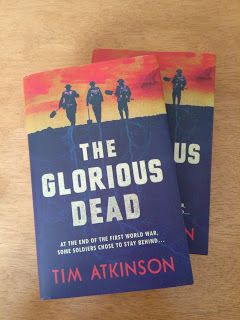
This one, however, has just nominated for the Costa Book Award, and is inspirational. It's also a timely reminder of the wafer thin line we all tread between happy, homely lives and - in the case of Raynor Winn and her terminally ill husband - a tent, a rucksack and each other.
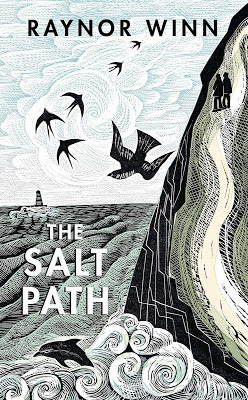
Talking of which, if you really want to buy someone something, how about a roof over their head? Ok, not literally buying them a house or flat or bungalow, but, y'know... there are ways we can all help. And here's one from YMCA.

Come on folks. Most of us have got all we'll ever need and more besides. Let's turn Black Friday on its head.
First up, here's a conversation on Tumblr by some people working in retail today.

When did we become these frantic, headless chickens going round in circles chasing things we often don't need, can't afford and won't use?
Does this make us happy? It certainly doesn't if you're one of the many thousands of people paid a pittance to sell the stuff.
It undoubtedly makes a few people very, very rich indeed. They tend not to be the kind of nice people who pay their workers properly, protect their pensions and give what they don't need to charity. (Some do, I know. But not many.)
So basically, what we're all doing is making a few rather dodgy individuals even richer at the expense of a lot of other folks... including ourselves. Because once we've spent it, we've not got it.
Here's a revolutionary thought. Don't buy anything today. Don't buy anything apart from food and clothes for the children and the things you really do need.
If you must buy something for someone, buy them a book. (I've got a few of my own - including this one - you could do worse than take a look at!)

This one, however, has just nominated for the Costa Book Award, and is inspirational. It's also a timely reminder of the wafer thin line we all tread between happy, homely lives and - in the case of Raynor Winn and her terminally ill husband - a tent, a rucksack and each other.

Talking of which, if you really want to buy someone something, how about a roof over their head? Ok, not literally buying them a house or flat or bungalow, but, y'know... there are ways we can all help. And here's one from YMCA.

Come on folks. Most of us have got all we'll ever need and more besides. Let's turn Black Friday on its head.
Published on November 23, 2018 04:43
November 14, 2018
Let there be (less, blue) light...
Like most of us I probably spend more time than is healthy looking at a screen of one sort or another*. I've got a nifty gadget meaning I can stand up at my desk. I've got a tablet with a blue light filter that turns on after dark. And I get up from time to time and take a walk. But there's little doubt I'm probably getting far more blue light from my screen time than is good for me.
Blue light stimulates the brain and eyes and suppresses the production of melatonin - a hormone we produce to naturally regulate our sleep cycles. Eye strain, headaches, dry eyes and blurry vision are also common side-effects from too much screen time.
Enter, Ocushield...

I've been sent a pair of Ocushield specs to try and - although it's early days (this could be a placebo) I'm beginning to think that wearing them is starting to make things better.
Ocushield filters out blue light but doesn't affect your screen's display, or need to be turned on or off. It comes as shock and scratch proof screen protectors (which have an in-built privacy filter, blurring screens at non-direct angles) as well as the specs I've been sent to try.
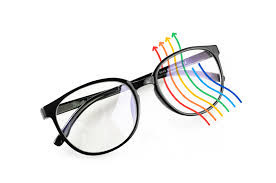
For more information about Ocushield visit www.ocushield.com.
*According to research for Ocushield, Brits spend 9 hours, 10 mins per day on digital screens compared to 4 hours, 10 mins socialising, eating and reading. They also spend more time on digital screens than sleeping and eating combined and an astonishing 83% of Brits use digital screens right before bed. Bad!
Blue light stimulates the brain and eyes and suppresses the production of melatonin - a hormone we produce to naturally regulate our sleep cycles. Eye strain, headaches, dry eyes and blurry vision are also common side-effects from too much screen time.
Enter, Ocushield...

I've been sent a pair of Ocushield specs to try and - although it's early days (this could be a placebo) I'm beginning to think that wearing them is starting to make things better.
Ocushield filters out blue light but doesn't affect your screen's display, or need to be turned on or off. It comes as shock and scratch proof screen protectors (which have an in-built privacy filter, blurring screens at non-direct angles) as well as the specs I've been sent to try.

For more information about Ocushield visit www.ocushield.com.
*According to research for Ocushield, Brits spend 9 hours, 10 mins per day on digital screens compared to 4 hours, 10 mins socialising, eating and reading. They also spend more time on digital screens than sleeping and eating combined and an astonishing 83% of Brits use digital screens right before bed. Bad!
Published on November 14, 2018 04:13
November 1, 2018
Publication day
I used to wonder what it'd be like, as an author, on the day your book - the baby you've lovingly and painstakingly brought up for three, four or five years - is finally published.
At one time I might have imagined lavish parties at the London offices of my publisher, attending by all manner of the literati, plus maybe on or two celebrities.
I've written (and had published) enough books now to know that doesn't often happen. So let me tell you what happened today - the day on which my latest book, The Glorious Dead, was launched upon the world.
First up (after the daily school run) was a trip to the dentist. Time and tide might wait for no man and a publisher's lead time might be long. But it's nothing compared to the waiting list to see the dentist.
So, check-up and a rather vigorous scale-and-polish over, it was home for breakfast before BBC Radio Humberside phoned for a telephone interview.
I really like these interviews. Although you'd think (having been provided with a crib sheet by the publicist) they'd all ask pretty similar questions there's always something new, or a new angle on an old question.
Yesterday it was machine-gun cleaning rods on BFBS (that's changed since the days of Cliff Mitchelmore and Jean Metcalfe). Today it was trench songs, which was appropriate as - straight after - I was booked for a Great War sing-a-long as part of the Remembrance Festival at St Botolph's, Boston Stump.
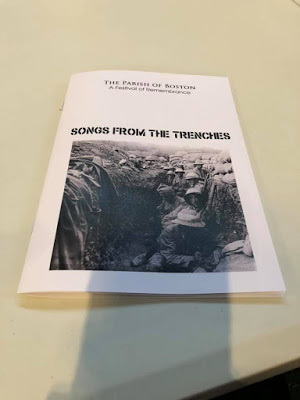
That's me at the front with the alarmingly bald pate...

And that was about that. I spent most of the afternoon (after an hour's singing) talking to the many people who'd turned up, some of whom had fascinating personal anecdotes about relatives who'd served in the Great War.
Every one of their stories was worth hearing. And - ultimately - that's what I hope I've been doing for the last five years of writing: telling the stories of the men who served their King and Country first with a rifle, then with a shovel.
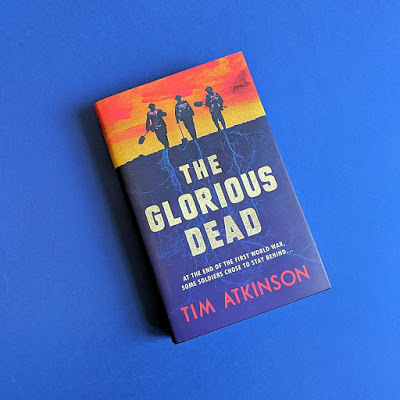
At one time I might have imagined lavish parties at the London offices of my publisher, attending by all manner of the literati, plus maybe on or two celebrities.
I've written (and had published) enough books now to know that doesn't often happen. So let me tell you what happened today - the day on which my latest book, The Glorious Dead, was launched upon the world.
First up (after the daily school run) was a trip to the dentist. Time and tide might wait for no man and a publisher's lead time might be long. But it's nothing compared to the waiting list to see the dentist.
So, check-up and a rather vigorous scale-and-polish over, it was home for breakfast before BBC Radio Humberside phoned for a telephone interview.
I really like these interviews. Although you'd think (having been provided with a crib sheet by the publicist) they'd all ask pretty similar questions there's always something new, or a new angle on an old question.
Yesterday it was machine-gun cleaning rods on BFBS (that's changed since the days of Cliff Mitchelmore and Jean Metcalfe). Today it was trench songs, which was appropriate as - straight after - I was booked for a Great War sing-a-long as part of the Remembrance Festival at St Botolph's, Boston Stump.

That's me at the front with the alarmingly bald pate...

And that was about that. I spent most of the afternoon (after an hour's singing) talking to the many people who'd turned up, some of whom had fascinating personal anecdotes about relatives who'd served in the Great War.
Every one of their stories was worth hearing. And - ultimately - that's what I hope I've been doing for the last five years of writing: telling the stories of the men who served their King and Country first with a rifle, then with a shovel.

Published on November 01, 2018 13:50
October 26, 2018
On my radio...
I was invited onto Carla Greene's afternoon show on BBC Lincolnshire yesterday, talking about... you've guessed it! And if you missed it, here it is again. With pictures.
Published on October 26, 2018 07:48
October 23, 2018
Cbeebies gets creative
Children can have fun and get creative this autumn half term with a series of digital treats from the BBC. These include a major new CBeebies app, Get Creative, children’s box sets on BBC iPlayer and CBeebies Bedtime Stories on smart speakers for the first time.
Get Creative
Available in app stores from today, Get Creative allows children to create music, design their own toy and even direct their very own CBeebies episode. When little ones open the app they will get to pick a CBeebies buddy from Hey Duggee, Go Jetters or Bitz and Bob before heading down to the Get Creative factory, where all the magic happens.
At launch there are four activities in the factory to choose from, with more to come in future, all cleverly designed for 3 – 5 year olds to use on their own or with an adult. And depending on which CBeebies buddy kids choose, each activity will take on a unique flavour:
Magic Paint: a unique drawing game where kids can use a variety of tools like crazy tape, stickers and paint that come alive as they use them
Terrific Toys: a digital toy creator, where kids can build their own CBeebies toys and play with them in a special playground
Sound Doodles: kids can create music with their doodles, with each squiggle able to make a range of sounds and noises
Play Puppets: kids can even direct their very own CBeebies episodes by animating puppets and recording their performances
BBC iPlayer box sets
Children can watch the full series of some of their favourite CBBC programmes on BBC iPlayer this half term. All five series of the popular children’s drama, Tracey Beaker, reality drama, The Next Step: The Stacey Carpenter Scholarship and the full series of The Dumping Ground: The Joseph & Taz Files and The Dumping Ground: Sasha’s Contact Meetings will be available to watch as box sets on BBC iPlayer.
CBeebies Bedtime Stories on smart speakers
Following the launch of the BBC Kids skill on Alexa smart speakers last month, little ones can now enjoy Bedtime Stories from some of the UK’s most famous voices simply by asking for them. Saying ‘Open CBeebies’ will give people the chance to hear stories from American singer-songwriter Dolly Parton, Olympic athlete Jessica Ennis-Hill and actors Mark Bonnar and Pearl Mackie. More exciting new stories from other well-known names will be coming soon.
Lucie McLean, Head of Childrens Products, BBC Design & Engineering says:
“Little ones won’t be short of things to do this half term, with a major new CBeebies app, BBC iPlayer box sets and new content on smart speakers for children. Get Creative is a brilliant example of how we are offering children new and exciting ways to interact with their favourite CBeebies’ characters. The app aims to spark kids’ imaginations through fun, exploratory experiences and open-ended play and I’m sure parents and children alike will enjoy getting creative this half-term.”
Get Creative, the BBC iPlayer box sets and the BBC Kids Skill form part of the BBC’s plans to invest in content that informs, educates and entertains children in response to the changing demands of modern life.
Get Creative
Available in app stores from today, Get Creative allows children to create music, design their own toy and even direct their very own CBeebies episode. When little ones open the app they will get to pick a CBeebies buddy from Hey Duggee, Go Jetters or Bitz and Bob before heading down to the Get Creative factory, where all the magic happens.
At launch there are four activities in the factory to choose from, with more to come in future, all cleverly designed for 3 – 5 year olds to use on their own or with an adult. And depending on which CBeebies buddy kids choose, each activity will take on a unique flavour:
Magic Paint: a unique drawing game where kids can use a variety of tools like crazy tape, stickers and paint that come alive as they use them
Terrific Toys: a digital toy creator, where kids can build their own CBeebies toys and play with them in a special playground
Sound Doodles: kids can create music with their doodles, with each squiggle able to make a range of sounds and noises
Play Puppets: kids can even direct their very own CBeebies episodes by animating puppets and recording their performances
BBC iPlayer box sets
Children can watch the full series of some of their favourite CBBC programmes on BBC iPlayer this half term. All five series of the popular children’s drama, Tracey Beaker, reality drama, The Next Step: The Stacey Carpenter Scholarship and the full series of The Dumping Ground: The Joseph & Taz Files and The Dumping Ground: Sasha’s Contact Meetings will be available to watch as box sets on BBC iPlayer.
CBeebies Bedtime Stories on smart speakers
Following the launch of the BBC Kids skill on Alexa smart speakers last month, little ones can now enjoy Bedtime Stories from some of the UK’s most famous voices simply by asking for them. Saying ‘Open CBeebies’ will give people the chance to hear stories from American singer-songwriter Dolly Parton, Olympic athlete Jessica Ennis-Hill and actors Mark Bonnar and Pearl Mackie. More exciting new stories from other well-known names will be coming soon.
Lucie McLean, Head of Childrens Products, BBC Design & Engineering says:
“Little ones won’t be short of things to do this half term, with a major new CBeebies app, BBC iPlayer box sets and new content on smart speakers for children. Get Creative is a brilliant example of how we are offering children new and exciting ways to interact with their favourite CBeebies’ characters. The app aims to spark kids’ imaginations through fun, exploratory experiences and open-ended play and I’m sure parents and children alike will enjoy getting creative this half-term.”
Get Creative, the BBC iPlayer box sets and the BBC Kids Skill form part of the BBC’s plans to invest in content that informs, educates and entertains children in response to the changing demands of modern life.
Published on October 23, 2018 04:38
October 16, 2018
The question is...
One of the perks of parenting is the questions. They're incessant, sometimes tiring ('You can pluck a tiger bald' Ted Hughes told his interlocutor daughter!) but often very, very funny.
'Daddy, you know a baby's made when a daddy's seed is mixed with a mummy's egg? Well, how does it get there?'
'Daddy, you know how we're all standing up but the world's round? Well, how do we know which way up we are?'
'Daddy, am I an iguana?'
'Daddy, when you an mummy got married, where was I?'
'Daddy, when you were little were you an evacuee?'
And so on...
I'm used to it. (Three kids, you just are!)
But this morning I got asked a question that stopped me in my tracks. As usual, it was just as we were about to leave the house. Shoes had been hastily fastened, bags packed, coats pulled on and we were about to step outside when...
'Daddy?' [Embarrassed smile!] 'Am I fat?'
My mind went blank for a moment. I know how important it is to respond appropriately, to take each question seriously, not to mock, not to dismiss, not to dissemble. But what could I say?
I also know - and hope to have practised - the importance of not commenting negatively or otherwise on the variety of shapes and sizes people come in. That's just the way the world is, I tell them. People are different. And your shape is just right for you.
But she's not fat, my seven-year-old daughter. Far from it. And she's not (as far as I'm aware) at all worried by it, or by anything else to do with her size or shape or hair or eye colour.
She wants to be a fairy. Or sometimes a puffin. And maybe a mermaid. But that's as far as her generalised dissatisfaction with being human goes. It does not (or has not) as far as I'm aware extended to even a fleeting desire to be any other (human) shape.
She eats well. We have a generally healthy diet. We eat meals together. Food isn't an 'issue'.
So, where does such a question (such a direct question) come from?
And how the hell do you answer it?
'Daddy, you know a baby's made when a daddy's seed is mixed with a mummy's egg? Well, how does it get there?'
'Daddy, you know how we're all standing up but the world's round? Well, how do we know which way up we are?'
'Daddy, am I an iguana?'
'Daddy, when you an mummy got married, where was I?'
'Daddy, when you were little were you an evacuee?'
And so on...
I'm used to it. (Three kids, you just are!)
But this morning I got asked a question that stopped me in my tracks. As usual, it was just as we were about to leave the house. Shoes had been hastily fastened, bags packed, coats pulled on and we were about to step outside when...
'Daddy?' [Embarrassed smile!] 'Am I fat?'
My mind went blank for a moment. I know how important it is to respond appropriately, to take each question seriously, not to mock, not to dismiss, not to dissemble. But what could I say?
I also know - and hope to have practised - the importance of not commenting negatively or otherwise on the variety of shapes and sizes people come in. That's just the way the world is, I tell them. People are different. And your shape is just right for you.
But she's not fat, my seven-year-old daughter. Far from it. And she's not (as far as I'm aware) at all worried by it, or by anything else to do with her size or shape or hair or eye colour.
She wants to be a fairy. Or sometimes a puffin. And maybe a mermaid. But that's as far as her generalised dissatisfaction with being human goes. It does not (or has not) as far as I'm aware extended to even a fleeting desire to be any other (human) shape.
She eats well. We have a generally healthy diet. We eat meals together. Food isn't an 'issue'.
So, where does such a question (such a direct question) come from?
And how the hell do you answer it?
Published on October 16, 2018 07:38
October 7, 2018
Authors Unbound
Further to my post a couple of weeks ago about the lacklustre response of my local Waterstones to the imminent publication of my latest book, let me big them up. Actually, let me big up both them and the indomitable Eamonn Griffin who organised a day-long event at Waterstones, Nottingham, at which, well... read for yourself!
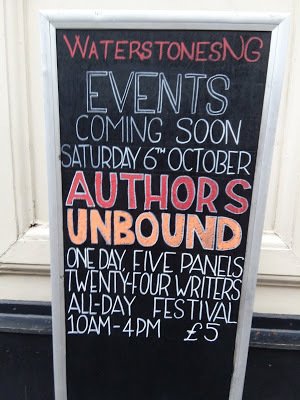
My lot was to be on what turned out to be the smallest panel of the day. (One of the authors didn't turn up!) But what we lacked numerically we made up for in verbosity. Oh yes.

Even with a sore throat I can talk...

And the job of moderating the panel (panel? More like three friends - and after yesterday, in spite of never having met them before, I certainly think of Paul Holbrook and Max Hawker as friends - chatting at the bar) was made easy by virtue of my fellow authors having such interesting things to say. Which, in turn, comes from having written such interesting books.

But then, that went for the day as a whole.
Here are a few more pics for those of you who couldn't make it (and you missed a treat).
The 'new voices' panel (Lulu Allison, Stephanie Bretherton and Eamonn Griffin) was chaired by the brilliant Virginia Moffatt pictured here reading from her novel Echo Hall).
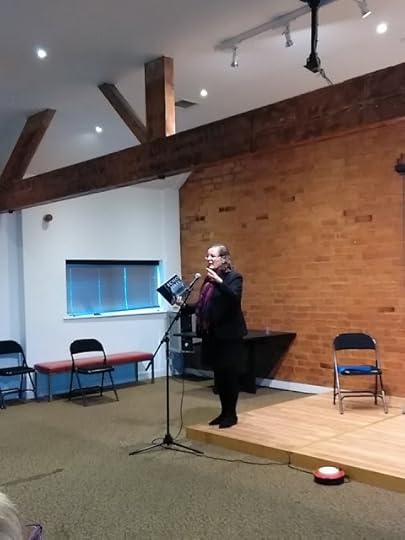
Panel 2, entitled 'genre writing' was without doubt the largest, numerically. Here's Amy Lord discussing her novel 'The Disappeared'. (Fellow panelists include Eli Allison, Alys Earl, Miles Hudson and Joshua Winning.)

The non-fiction panel covered such topics as street photogaphy (Stephen Leslie) and photo biography (John-Michael O'Sullivan), death festivals (Emma Pusill) and plein air swimming as expounded here by the indefatigable Emma Pusill, author of the Lido Guide. She's obviously been there... And got the t-shirt!

And - last but by no means least - here's Colgers himself (Stevyn Colgan) holding forth on the comedy panel, which also featured Sue Clark, PJ Whiteley, Patrick Kinkaid and Robert Woodshaw.

So, there you have it. If you didn't make it, you can always click the links (above) and find out more about the work of this talented and diverse bunch for yourself.
You won't be disappointed!

My lot was to be on what turned out to be the smallest panel of the day. (One of the authors didn't turn up!) But what we lacked numerically we made up for in verbosity. Oh yes.

Even with a sore throat I can talk...

And the job of moderating the panel (panel? More like three friends - and after yesterday, in spite of never having met them before, I certainly think of Paul Holbrook and Max Hawker as friends - chatting at the bar) was made easy by virtue of my fellow authors having such interesting things to say. Which, in turn, comes from having written such interesting books.

But then, that went for the day as a whole.
Here are a few more pics for those of you who couldn't make it (and you missed a treat).
The 'new voices' panel (Lulu Allison, Stephanie Bretherton and Eamonn Griffin) was chaired by the brilliant Virginia Moffatt pictured here reading from her novel Echo Hall).

Panel 2, entitled 'genre writing' was without doubt the largest, numerically. Here's Amy Lord discussing her novel 'The Disappeared'. (Fellow panelists include Eli Allison, Alys Earl, Miles Hudson and Joshua Winning.)

The non-fiction panel covered such topics as street photogaphy (Stephen Leslie) and photo biography (John-Michael O'Sullivan), death festivals (Emma Pusill) and plein air swimming as expounded here by the indefatigable Emma Pusill, author of the Lido Guide. She's obviously been there... And got the t-shirt!

And - last but by no means least - here's Colgers himself (Stevyn Colgan) holding forth on the comedy panel, which also featured Sue Clark, PJ Whiteley, Patrick Kinkaid and Robert Woodshaw.

So, there you have it. If you didn't make it, you can always click the links (above) and find out more about the work of this talented and diverse bunch for yourself.
You won't be disappointed!
Published on October 07, 2018 10:17
October 4, 2018
Room with a View
 Sea Room: An Island Life in the Hebrides by Adam Nicolson
Sea Room: An Island Life in the Hebrides by Adam NicolsonMy rating: 4 of 5 stars
Nicolson is a man after my own heart, a man with an interest in almost everything. This tour de force not only covers geology, ecology, biology, history, theology, social policy and a whole lot more, but does it with an immediacy and skill that feels like the slap of a big, wet Minch wave on the side of a boat and the cold spray of the sea on your face. No romantic 'I-land'-ism, the book portrays the harsh realities of life as it must've been lived for pretty much everybody (at least, the majority) from the Bronze Age onwards: nasty, brutish, and short. But at the same time capable of transcending the awful everyday realities and gaining a deeper appreciation of the land and life passed on through generations in folk lore and poetry. So, why just four stars? Well, if I had one criticism (I do, and this is it) it's that the book struggles just a little on the last leg of the voyage, as if the tide turns against it and landing on the islands is suddenly very tricky. But we get there. We haul the boat ashore and get to the house with its rats and its sea room. And all it well. We hope.
View all my reviews
Published on October 04, 2018 09:13



